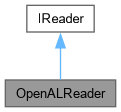This class is used for sine tone playback. More...
#include <OpenALReader.h>

Public Member Functions | |
| OpenALReader (Specs specs, int buffersize=AUD_DEFAULT_BUFFER_SIZE) | |
| Creates a new reader. | |
| virtual bool | isSeekable () const |
| Tells whether the source provides seeking functionality or not. | |
| virtual void | seek (int position) |
| Seeks to a specific position in the source. | |
| virtual int | getLength () const |
| Returns an approximated length of the source in samples. | |
| virtual int | getPosition () const |
| Returns the position of the source as a sample count value. | |
| virtual Specs | getSpecs () const |
| Returns the specification of the reader. | |
| virtual void | read (int &length, bool &eos, sample_t *buffer) |
| Request to read the next length samples out of the source. | |
| Public Member Functions inherited from IReader | |
| virtual | ~IReader () |
| Destroys the reader. | |
Detailed Description
This class is used for sine tone playback.
The output format is in the 16 bit format and stereo, the sample rate can be specified. As the two channels both play the same the output could also be mono, but in most cases this will result in having to resample for output, so stereo sound is created directly.
Constructor & Destructor Documentation
◆ OpenALReader()
| OpenALReader::OpenALReader | ( | Specs | specs, |
| int | buffersize = AUD_DEFAULT_BUFFER_SIZE ) |
Creates a new reader.
- Parameters
-
specs The desired specification of the output samples. buffersize The buffer size used to read from the device.
Member Function Documentation
◆ getLength()
|
virtual |
Returns an approximated length of the source in samples.
- Returns
- The length as sample count. May be negative if unknown.
Implements IReader.
◆ getPosition()
|
virtual |
Returns the position of the source as a sample count value.
- Returns
- The current position in the source. A negative value indicates that the position is unknown.
- Warning
- The value returned doesn't always have to be correct for readers, especially after seeking.
Implements IReader.
◆ getSpecs()
|
virtual |
◆ isSeekable()
|
virtual |
Tells whether the source provides seeking functionality or not.
- Warning
- This doesn't mean that the seeking always has to succeed.
- Returns
- Always returns true for readers of buffering types.
Implements IReader.
◆ read()
|
virtual |
Request to read the next length samples out of the source.
The buffer supplied has the needed size.
- Parameters
-
[in,out] length The count of samples that should be read. Shall contain the real count of samples after reading, in case there were only fewer samples available. A smaller value also indicates the end of the reader. [out] eos End of stream, whether the end is reached or not. [in] buffer The pointer to the buffer to read into.
Implements IReader.
◆ seek()
|
virtual |
Seeks to a specific position in the source.
- Parameters
-
position The position to seek for measured in samples. To get from a given time to the samples you simply have to multiply the time value in seconds with the sample rate of the reader.
- Warning
- This may work or not, depending on the actual reader.
Implements IReader.
The documentation for this class was generated from the following file:
- openal/OpenALReader.h
Generated by